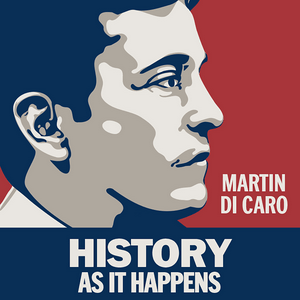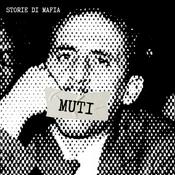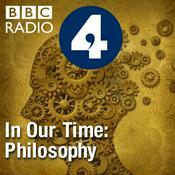543 episodi
- Subscribe now to enjoy ad-free listening and bonus content. Keep the narrative flow going in 2026!
It wasn't very long ago when U.S. policymakers relied on a species of grand strategist known as the Sovietologist. It was the Cold War, and the strategies for dealing with the USSR ranged from containment to rollback, to détente and peaceful bridge-building. Zbigniew Brzezinski formulated the latter. President Jimmy Carter's national security adviser was an ardent anti-communist with a pragmatic streak, whose goal was to accelerate the breakup of the Soviet Empire. He also supported Palestinian autonomy, and after the Cold War, Brzezinski backed NATO expansion in Eastern Europe while criticizing the excesses of the global war on terror.
In this episode, the Financial Times' Edward Luce discusses his timely biography, Zbig: The Life of Zbigniew Brzezinski, America's Great Power Prophet.
Also read:
Martin Di Caro's review of Luce's book for Responsible Statecraft. - Subscribe for 24/7 access to the entire catalog of 500+ episodes. Non-subscribers may listen to only the 40 most recent episodes.
President Trump's harsh immigration crackdown would not be possible without a militarized law enforcement apparatus that presidents and legislators of both political parties built over decades. Even before the 9/11/2001 terrorist strikes, immigration began to be viewed as a national security concern requiring billions to beef up enforcement and deportations, while sensible immigration reform failed to pass Congress time and again. In this episode, historian Jeremi Suri explores the origins of today's crisis as President Trump's federal paramilitary force terrorizes American communities.
Jeremi Suri teaches history at the LBJ School of Public Affairs at the University of Texas at Austin. He writes the newsletter Democracy of Hope and co-hosts This is Democracy podcast.
Subscribe to History As It Happens Premium: www.historyasithappens.com
Further reading:
ICE Needs the DOGE Treatment by Jeremi Suri (Wall Street Journal) - Subscribe now to listen to the entire 28-minute episode. (Or preview 7 minutes).
On the streets of Minnesota, a federal paramilitary force in combat gear is executing a deliberate policy of terror and violence against American citizens and their immigrant neighbors. The lawless conduct of President Trump's immigration enforcers has supercharged a debate that's been roiling since 2016: Is Trumpism a form of fascism?
In this episode, historian Roger Griffin argues that American (and global) democracy is under assault not from a resurgence of fascism, but from anti-liberal forces and ideas at odds with the universal values that were supposed to gain ascendance after 1945: democracy, human rights, and tolerance. - Subscribe now for 24/7 access to the entire catalog of 500+ episodes, ad-free listening, and bonus content. Non-subscribers may listen to only the 40 most recent episodes.
The Trump administration's National Security Strategy calls for "flexible realism" in foreign policy, a supposed departure from the military adventurism that led to disasters in the Greater Middle East. Realism prioritizes national interests rather than ideology or high principles, such as democracy and human rights. Is Donald Trump a realist? What are the historical origins of realism? What are its opposites? In this episode, scholars Linda Kinstler and Stephen Wertheim break it down.
Linda Kinstler is a contributing writer for New York Times Magazine and a junior fellow at the Harvard Society of Fellows.
Stephen Wertheim is a senior fellow in the American Statecraft Program at the Carnegie Endowment for International Peace.
Recommended reading:
The Theory That Gives Trump a Blank Check For Aggression by Linda Kinstler (New York Times) - Subscribe now to enjoy ad-free listening and bonus content. Keep the narrative flow going in 2026!
This month Iran's clerical leaders and security forces spilled oceans of blood to suppress mass demonstrations after Iranians took to the streets to protest the regime's economic and political failings. Systematic violence has always been a tool utilized by the Islamic Republic to enforce obedience, but never in its history have Iran's leaders killed so many people in a short amount of time, if an estimated death toll of at least 10,000 — possibly 20,000 — is accurate. In this episode, historian Naghmeh Sohrabi examines the origins of a regime whose current government is desperately trying to hold onto power by killing thousands of its people.
Recommended reading:
These Are the True Things — Naghmeh Sohrabi's Substack about Iran/Middle East
How much longer can Iran's Islamic Republic survive? by Ali Ansari (New Statesman)
Iran's coming reckoning by Siamak Namazi (Middle East Institute)
Iran's ayatollah will fall — but the road may be long and deadly by Simon Sebag Montefiore (The Times of London)
Altri podcast di Storia
Podcast di tendenza in Storia
Su History As It Happens
Discover how the past shapes the present with the best historians in the world. Everything happening today comes from something, somewhere. History As It Happens features interviews with today's top scholars and thinkers, interwoven with audio from history's archive.
Subscribe for ad-free episodes and access to the entire podcast catalog: https://historyasithappens.supercast.com/
Sito web del podcastAscolta History As It Happens, Dentro alla storia e molti altri podcast da tutto il mondo con l’applicazione di radio.it

Scarica l'app gratuita radio.it
- Salva le radio e i podcast favoriti
- Streaming via Wi-Fi o Bluetooth
- Supporta Carplay & Android Auto
- Molte altre funzioni dell'app
Scarica l'app gratuita radio.it
- Salva le radio e i podcast favoriti
- Streaming via Wi-Fi o Bluetooth
- Supporta Carplay & Android Auto
- Molte altre funzioni dell'app


History As It Happens
Scansione il codice,
scarica l'app,
ascolta.
scarica l'app,
ascolta.








































